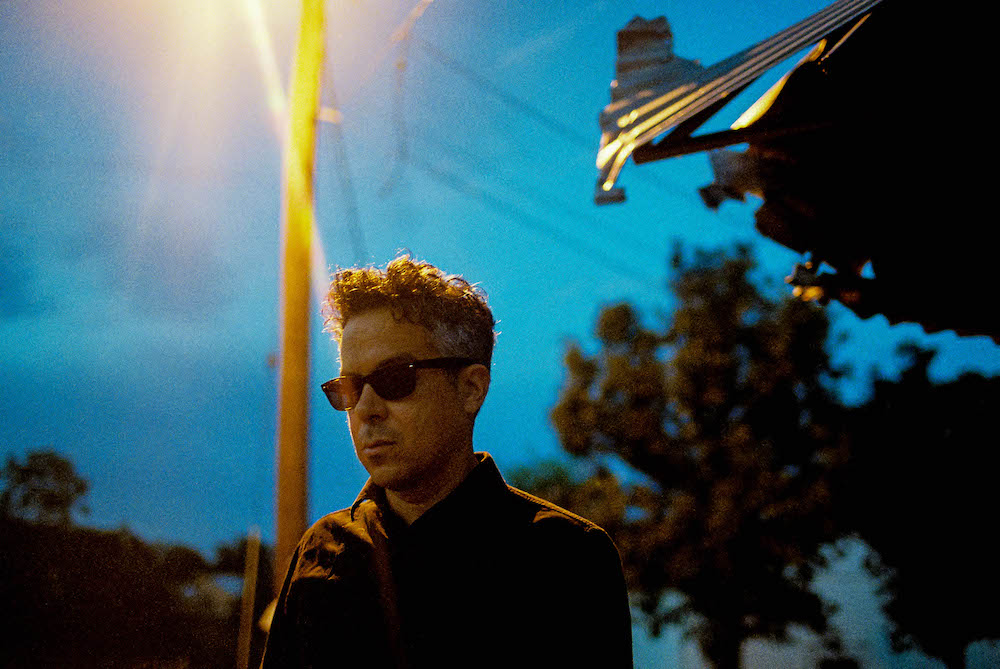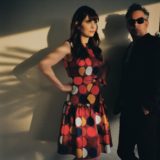Blending firsthand familial migratory history with modern-day news cycle narratives set to a soundtrack built on acoustic six-string melodies with a side of synth voyaging is the current artistic quest M. Ward finds himself on with his latest effort, Migration Stories. His familiar dreamlike structural plodding is still intact with a bit of psych spaciness thrown in for good measure, moving the songwriter’s musical existence in forward motion.
Coming off of the 20 year anniversary of his debut record, Duet for Guitars #2, Ward, the long-tenured indie-folk experimentalist, has kept a relatively lo-fi profile since, amidst amassing an impressive collaborative resume which includes work with the likes of Zooey Deschanel (She & Him), Monsters of Folk (Jim James, Conor Oberst, and Mike Mogis), Norah Jones, Neko Case, Cat Power, Beth Orton and many more.
With that very thing in mind, Ward, leading up to the release of his latest album, Migration Stories (Anti-), has released three singles in anticipation of the record’s launch. Those tunes, “Migration of Souls,” “Unreal City,” and most recently, “Torch,” set the tone for the entire batch of tunes that comprise Ward’s 10th album. It starts with Ward and a guitar and winds up with sonically textural delights due to the employ of Arcade Fire’s Tim Kingsbury, Richard Reed Parry, producer/mixer Craig Silvey (Arcade Fire, Arctic Monkeys, Florence and the Machine) and Teddy Impakt.
SPIN caught up with the traveling songster to learn more about his own tune writing migrations and what excites him about his latest, impending release.
SPIN: Let’s talk about the latest record, Migration Stories. First things first – what were your goals for this effort? When do you know “it’s time” when it comes to putting thoughts and melodies to tape?
M. Ward: Well, it’s a kind of, hmmm… I’m always writing, but I think I know it’s time when there’s maybe 20 songs that communicate to me in one way or another that sort of fit together. They tell me we’re done, and it’s at that time that I know it’s time to go to the studio. That said, I basically start at home… I just use GarageBand to get the ideas down. They serve as the intermediary – the blueprints – which I then take to the actual studio. For this record, I got to put myself in a little bit of a different situation and recorded in Montreal, which was a great experience.
Yeah, let’s talk about that a bit more… You got to work with Arcade Fire’s Tim Kingsbury, Richard Reed Parry, producer/mixer Craig Silvey (Arcade Fire, Arctic Monkeys, Florence and the Machine) and Teddy Impakt. What did these gentlemen add to the recipe here? What do you appreciate about collaborating with other folks?
Yeah, I’ve never collaborated with anyone who has as much knowledge as they do about old keyboards and synthesizers and textures… They added textures to the sound that I have never seen or heard, let alone used on any of my records, so that was an eye-opener – or, maybe an ear opener? Maybe that’s what it was (chuckles).
As far as Migration Stories is concerned, and the work you did with the other fellas here, and digging into this idea of the sonic expanders with the synthesizers and whatnot some more; I mean do you hear any of these sounds in your brain when you’re writing your tunes or do you just give the other musicians you pull into the room with you full artistic freedom to color in your tunes? How do you approach the process of flushing out of tune with other folks?
Usually, I leave half of it unfinished so that some improvisation can happen during the recording. The other half is pretty much pre-programmed with the chord structures, and lyrics, and melodies… But it’s a lot more exciting when you give your musicians room to breathe. I’m really lucky to be working with talented people who can always, you know, surprise me in the studio, and that’s normally a good sign that this song is going in the right direction when you’re being surprised.
When it comes to songwriting, how does it all happen for you? Do you have words in place, or do you work the instrumental angle first?
Well, ever since I was 15, I’ve made it a habit to spend an hour or two with the guitar with very little agenda other than enjoy the time in a space to experiment. Half the time it’s learning other people’s songs and then half the time working on new songs that I’m writing. They live in this giant archive that I have on GarageBand and uh, I love to occasionally pick one out of the hat for a performance that happens for no one but myself and maybe my dog will be around. If the song feels good when I’m performing it, then that tells me it’s something to work on and not throw it away just yet… But there’s hundreds and hundreds of songs. When it comes time to make a record, I find the songs that I’m most excited about that seems to fit together either sonically or lyrically.
In the end, how do you know when a song/record is done? Does the dog let out a howl, or is the howl a bad sign?
I’m trying to teach her that (laughs). She’s old, so she, you know, she’s not up-to-speed as far as that’s concerned. I wish she was a little smarter, but she’s not.
But, yeah, if I can visualize myself performing it to a crowd, or if I can visualize myself playing it to even a friend, that tells me that it’s probably done. If it seems like I’m unwrapping something too early, then I’ll just keep it in my GarageBand until I have time to work on it some more.
Migration Stories marks your 10th full-length release. Did you pull in any lessons from past recording experiences that helped inform the way this batch of tunes came together?
Oh, always. I’m always learning in the studio and I guess the biggest thing is to… don’t come into the studio with everything pre-programmed and pre-written. I’ve tried that, and uh, you end up with something that feels a little bit cold. I’ve found that if you leave space for some chaos and for some x-factor. And for some unprogrammed moments between you and the other musicians and the other engineers who are you know orchestrating the science of it, then something memorable happens. That’s been my experience and it keeps me excited about producing records.
You’ve got a cover on this record, “Along the Santa Fe Trail,” written by Al Dubin and Hugh Williams (popularized by Glenn Miller). Why’d you choose to include this rendition into the mix here? What about the tune spoke to you?
Well, over the last couple of years I’ve been compiling songs and the two biggest things that were leading me on were these never-ending newspaper articles about the migration crisis and traveling to Europe and realizing that the problem that they are experiencing is almost exactly the same as the one that we have in North America. I was also simultaneously learning about my grandfather’s migration from Mexico to the USA by way of El Paso about 120 years ago… There were never… there’s not any photos or journals of that time. All I have are stories from family. This song, “Along the Santa Fe Trail,” came out of nowhere. I was driving down the road in Los Angeles and heard it on AM radio. I just thought it was a beautiful song and I loved the idea of trying to fill in the blanks with some of your ancestors past with music, whether or not you’re listening to music or certain songs that can fill in the blanks, or maybe writing a song can fill in the blank along the way; I like the idea of music filling up that space.
On a personal level how do you feel about the record as a whole? Are you excited to get it out there and have people hear it?
Ward: I’m really excited about people hearing it. At the moment I’m arranging the songs for a tour that’s gonna start up in April. I’m really excited to get it out there, and, to get back out there and bring these songs around to folks in a live setting.
In general, why music? Why do you seek it? Why do you create it?
Music is something that I’ve been doing since I was a teenager, and at this point I can’t stop. It’s one of those, you know, habits that uh… it’s the deepest habit that I have and I’m happy that it’s a healthy habit (chuckles). That said, I feel like I have no choice. I could tell myself that I’m just going to stop, but uh, it’s not something that I see stopping anytime soon. I still love the process, so that keeps me going.





